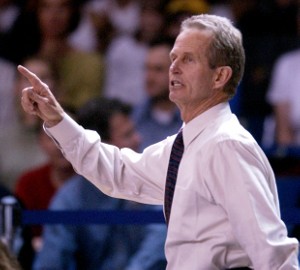Again and again we are asked in our training, whether the purchase and use of a ball machine is useful or why we are not using ball machines. About practice with a ball machine, there are several scientific studies. They mainly come to the result that their use obviously causes significant changes in the timing and the control, which leads to a reduction in the quality of the transfer of playing ability compared to practice with a real partner. Machines weiterlesen
Archiv für den Monat: August 2016
Play the game
Blocked vs random practice!
„The random versus blocked practice methods represent a fundamental paradox regarding athletic performance during training and subsequent performance during competition. Based on performance measurements during practice, blocked activities, in which athletes repeatedly rehearse the same task, result in superior performance during the training session. In comparison, performing tasks and skills in random order decreases skill acquisition during training. Consequently, based on measurement of performance effects during practice, many coaches and players believe that blocked practice is superior to random practice. Such a conclusion however, mistakenly assumes a positive correlation between performance in practice and long-term skill retention. The paradox arises from the fact Play the game weiterlesen
The Myth of the correct technique
 Tomaz Mencinger, a colleague working as a tennis coach in slovenia, has very often interesting posts on his webside feeltennis.net. This time he wrote a nice article about „the myth of the correct technique“ and connected his thoughts with videos of Roger Federers forehand and more. Exciting the quote of Rafa Nadal:
Tomaz Mencinger, a colleague working as a tennis coach in slovenia, has very often interesting posts on his webside feeltennis.net. This time he wrote a nice article about „the myth of the correct technique“ and connected his thoughts with videos of Roger Federers forehand and more. Exciting the quote of Rafa Nadal:
„From the moment the ball is in motion, The Myth of the correct technique weiterlesen
Sprache „macht Wirklichkeit“
Sprache wirkt und „macht Wirklichkeit“!
Beobachtungen aus der Kommunikationswissenschaft werden im Tennistraining und im Spielercoaching leider zu selten berücksichtigt. Was der Coach sagt, wird vom Spieler interpretiert und hat – in der Regel – eine nachhaltige Wirkung auf das Denken und die innere Haltung des Spielers. Deshalb ist es für den Coach wichtig, auf Wirkung von Worten zu achten und passende Worte zu verwenden. (Zusammengestellt von den TMS Coaches Frercks Hartwig und Christian Köhler).
Tennistraining und im Spielercoaching leider zu selten berücksichtigt. Was der Coach sagt, wird vom Spieler interpretiert und hat – in der Regel – eine nachhaltige Wirkung auf das Denken und die innere Haltung des Spielers. Deshalb ist es für den Coach wichtig, auf Wirkung von Worten zu achten und passende Worte zu verwenden. (Zusammengestellt von den TMS Coaches Frercks Hartwig und Christian Köhler).
Hier ein paar Beispiele und Vorschläge zu einer veränderten Ausdrucksweise:
- „Versuche mal….“ Versuchen beinhaltet schon immer den Hinweis auf die Möglichkeit des Scheiterns. Besser ist… das Wort „versuchen“ aus dem Trainerwortschatz zu verbannen und den Spieler anzuleiten, es doch mal so „zu machen“.